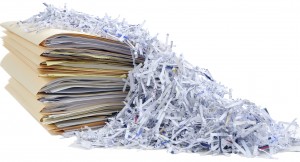Let’s Talk About School Records
School Record Shredding? Here are some best practices for destroying student data. September is a month to say goodbye to summer and hello to school! Whether it’s elementary, middle school, high school, and even college, if you’ve been a student, then you most certainly have a student record. What exactly happens to those records once you’ve graduated?
We already know that the proper disposal of information and data is important to minimize the use of valuable space, promote efficiency, assist in the day-to-day operations whether you’re a business or a resident. The same rule applies to schools across the country. Schools hold lots of personal information on students and must be held accountable for privacy.
Just like businesses, schools must reduce the cost of storage of unneeded records, and reduce the risk of identity theft and/or breaches of privacy, computer fraud, and related harms. Districts should have a policy in place to take reasonable measures to protect against unauthorized access to or use of records and information/data, and properly dispose of paper and electronic records and information.
Schools are not mandated by federal law to have a specific retention record for student records. The Family Educational Rights and Privacy Act, or FERPA, is the federal law that protects the privacy of student education records. Under FERPA, there is a difference between allowing access to records and providing copies. FERPA does not require that copies of documents be provided. Rather, FERPA establishes the right of parents “to inspect and review the education records of their children.” The law requires schools to establish procedures that enable parents to review their children’s records within a reasonable time after a request is made. While it does not specify requirements regarding student record shredding, it does require that schools keep FERPA-protected data and not destroy records if there is an outstanding request to review them.
According to FERPA’s best practices document on data destruction, records can be “…destroyed when no longer needed for the specific purpose for which it was disclosed, and that the written agreement specify the time period for destruction.”
FERPA’s best practices also include approved methods for destroying data, like hard drive destruction, degaussing, and of course, paper shredding.
Essentially, the destruction of all paper and electronic records must be by shredding, erasing, or otherwise modifying the information of the record to make the record unreadable, undecipherable or non-reconstructable through generally available means.
It’s hard to say exactly how long districts must retain student records. State and district procedures vary on this, and it also depends on the type of student record. Districts should follow protocols as outlined by their state departments of education and local laws.
When you’re ready to shred, Legal Shred can help.
Legal Shred can service any school by helping to destroy old student records and supporting data that have surpassed their retention period. Contact Legal Shred today to discuss our one-time and routine school record shredding services.
Service Areas: Florida Shredding; Orlando Shredding; Tampa Shredding; Naples Shredding; New York Shredding; Westchester Shredding; Long Island Shredding and more!

